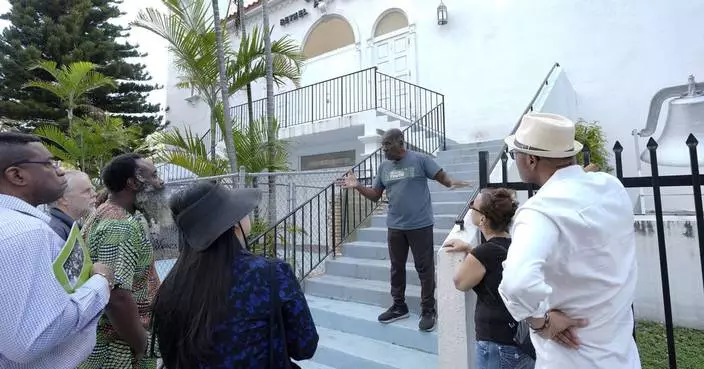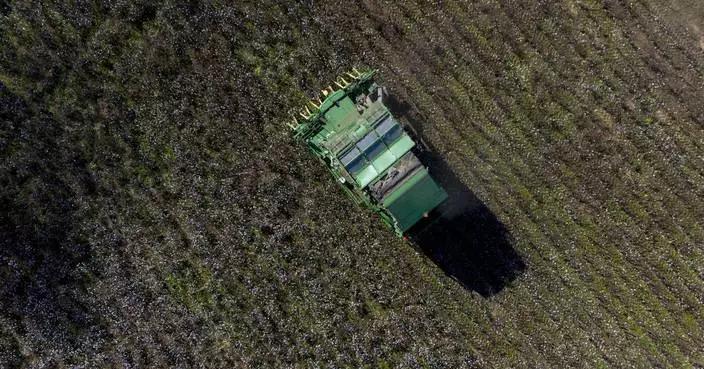FORT LAUDERDALE, Fla. (AP) — Ballet dancer Michaela Mabinty DePrince, who came to the United States from an orphanage in war-torn Sierra Leone and performed on some of the world's biggest stages, has died, her family said in a statement. She was 29.
“Michaela touched so many lives across the world, including ours. She was an unforgettable inspiration to everyone who knew her or heard her story,” her family said in a statement posted Friday on DePrince's social media accounts. “From her early life in war-torn Africa, to stages and screens across the world, she achieved her dreams and so much more.”
A cause of death was not provided.
DePrince was adopted by an American couple and by age 17 she had been featured in a documentary film and had performed on the TV show “Dancing With the Stars.”
After graduating from high school and the American Ballet Theatre’s Jacqueline Kennedy Onassis School, she became a principal dancer Dance Theatre of Harlem. She then went to the Netherlands, where she danced with the Dutch National Ballet. She later returned to the U.S. and joined the Boston Ballet in 2021.
“We’re sending our love and support to the family of Michaela Mabinty DePrince at this time of loss,” the Boston Ballet said in a statement to The Associated Press on Saturday. “We were so fortunate to know her; she was a beautiful person, a wonderful dancer, and she will be greatly missed by us all.”
In her memoir, “Taking Flight: From War Orphan to Star Ballerina,” she shared her journey from the orphanage to the stage. She also wrote a children's book, Ballerina Dreams.
DePrince suffered from a skin pigmentation disorder that had her labeled “the devil’s child” at the orphanage.
“I lost both my parents, so I was there (the orphanage) for about a year and I wasn’t treated very well because I had vitiligo,” DePrince told the AP in a 2012 interview. “We were ranked as numbers and number 27 was the least favorite and that was my number, so I got the least amount of food, the least amount of clothes and whatnot.”
She told added that she remembered seeing a photo of an American ballet dancer on a magazine page that had blown against the gate of the orphanage during Sierra Leone's civil war.
“All I remember is she looked really, really happy,” DePrince told the AP, adding that she wished “to become this exact person.”
She said she saw hope in that photo, “and I ripped the page out and I stuck it in my underwear because I didn’t have any place to put it,” she said.
Her passion helped inspire young Black dancers to pursue their dreams, her family said.
“We will miss her and her gorgeous smile forever and we know you will, too,” their statement said.
Her sister Mia Mabinty DePrince recalled in the statement that they slept on a shared mat in the orphanage and used to make up their own musical theater plays and ballets.
“When we got adopted, our parents quickly poured into our dreams and arose the beautiful, gracefully strong ballerina that so many of you knew her as today. She was an inspiration,” Mia DePrince wrote. “Whether she was leaping across the stage or getting on a plane and flying to third-world countries to provide orphans and children with dance classes, she was determined to conquer all her dreams in the arts and dance.”
She is survived by five sisters and two brothers. The family requested that in lieu of flowers, donations could be made to War Child, which is an organization that DePrince was involved with as a War Child Ambassador.
“This work meant the world to her, and your donations will directly help other children who grew up in an environment of armed conflict,” the family statement said.

Michaela DePrince, center, instructs intermediate ballet students at BE Dance Studios in Miami Gardens, Fla. on July 14, 2015. (Carl Juste/Miami Herald via AP, File)

FILE - In this Tuesday, July 10, 2012 photo, dancer Michaela DePrince rehearses for her lead role in Le Corsaire in Johannesburg. (AP Photo Denis Farrell, File)

FILE - This Monday July 9, 2012 photo shows dancer Michaela DePrince in Johannesburg. (AP Photo Denis Farrell, File)
President-elect Donald Trump's billionaire ally Elon Musk played a key role this week in killing a bipartisan funding proposal that would have prevented a government shutdown, railing against the plan in a torrent of more than 100 X posts that included multiple false claims.
The X owner, an unelected figure, not only used his outsize influence on the platform to help sway Congress, he did so without regard for the facts and gave a preview of the role he could play in government over the next four years.
“Trump has got himself a handful with Musk,” John Mark Hansen, a professor of political science at the University of Chicago, said in an email. “Trump’s done this kind of thing before, blowing up a bill at the last minute. This time, though, it looks like he was afraid of Musk upstaging him. Now there’s a new social media bully in town, pushing the champion social media bully around.”
Hansen added: “We’ll see what Musk’s influence is when he runs up against reality — like when he proposes cutting off ‘wasteful’ spending for other people but not NASA contracts for Space-X.”
Musk’s objections to the 1,547-page omnibus bill included misinformation about congressional salaries, federal funding and public health preparedness, among other topics.
He alleged that the plan included a 40% raise for lawmakers. But the maximum pay increase possible through the proposal would have been 3.8%, according to the Congressional Research Service.
One way that members of Congress can receive a pay raise is through automatic adjustments that go into effect unless denied by law. Most members make $174,000 per a year after their last increase of 2.8% in 2009. Congressional leadership is the exception, with the Speaker of the House earning the most at $223,500 annually.
The rejected bill struck a section from a previous appropriations act that denied members of Congress this automatic pay raise. A maximum increase of 3.8% would have bumped their annual salary by about $6,600, to approximately $180,000 annually.
Musk also shared a post from another user that falsely claimed the bill provided $3 billion in funding for a potential new stadium for the NFL's Washington Commanders, commenting: “This should not be funded by your tax dollars!”
The bill included a provision to transfer control of the land that houses RFK Stadium from the federal government to the District of Columbia. That transfer is necessary to pave the way for the Commanders to possibly build a new stadium in the franchise's old home — though the team is still considering other locations.
However, no such funding is provided by the bill. It states, in fact, that the federal government “shall not be responsible for payment or any costs or expenses” that the District of Columbia incurs after the transfer is complete aside from responsibilities related to specific environmental issues.
District of Columbia Mayor Muriel Bowser addressed false claims about the stadium's funding on Thursday, calling them “frustrating.”
“It was stated that the C.R. contains $3 billion for a stadium,” she said at a press conference. "All wrong. There are no federal dollars related to the transfer of RFK and in fact, the legislation does not require or link at all to a stadium.
Bowser added that she has reached out to the Trump administration to correct misinformation about this issue.
In a third post, Musk incorrectly claimed that “We're funding bioweapon labs in this bill!”
The plan provided funds for up to 12 regional biocontainment research laboratories, not facilities for creating bioweapons. It stipulates that among their uses, the labs will conduct biomedical research to prepare for biological agents such as emerging infectious diseases.
A spokesperson for Musk did not immediately respond to a request for comment from the Associated Press.
Some members of Congress expressed dismay that Musk had disseminated misinformation about the bill.
“I love you Elon but you need to take 5 seconds to check your sources before highlighting bottom feeders looking for clicks,” Rep. Dan Crenshaw, a Texas Republican, wrote on X.
In a hastily convened Thursday evening vote, the House rejected a new Trump-backed bill whittled down to 116 pages, with the bill failing 174-235. Dozens of Republicans joined Democrats in opposition.
The House finally approved a third spending deal Friday evening, and the Senate followed suit early Saturday. President Joe Biden planned to sign it into law later Saturday.
Trump led Republicans into the longest government shutdown in history in his first term during the 2018 Christmas season, and interrupted the holidays in 2020 by tanking a bipartisan COVID-relief bill and forcing a do-over.

FILE - Tesla and SpaceX CEO Elon Musk, left, and Republican presidential nominee former President Donald Trump attend a campaign event at the Butler Farm Show, Oct. 5, 2024, in Butler, Pa. (AP Photo/Alex Brandon, File)

FILE - President-elect Donald Trump listens to Elon Musk as he arrives to watch SpaceX's mega rocket Starship lift off for a test flight from Starbase in Boca Chica, Texas, Nov. 19, 2024. (Brandon Bell/Pool via AP, File)














